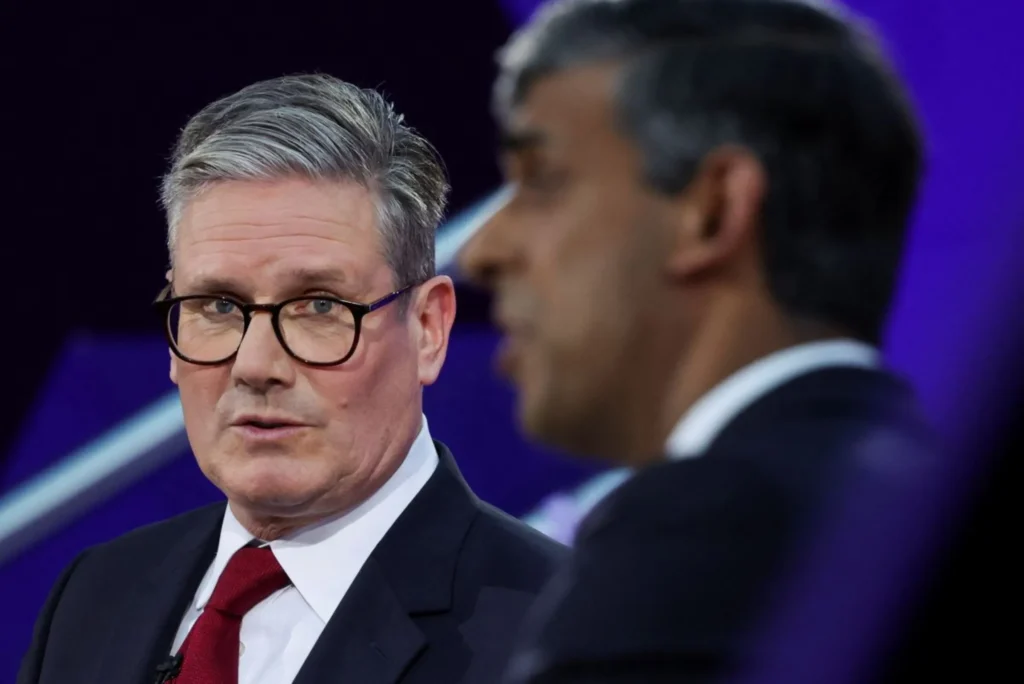- Web
- Feb 20, 2026
UK leaders avoid climate change in election campaign

LONDON: As Britain’s general election nears, the campaign trail has been dominated by issues such as immigration, the health service and a major insider betting scandal.
But one thing that has barely been discussed is the climate, according to data from the audience strategy consultancy AKAS shared with the Thomson Reuters Foundation.
Britain’s parties hold a range of positions on net zero, but several key climate terms have gained little attention in election-related media coverage, according to AKAS’ UK General Election Impact Tracker which analysed terms using the GDELT monitoring tool.
“Climate” was mentioned in 8 per cent of British media’s general election articles in the campaign up to June 30, compared to 17 per cent in the 2019 election. Two per cent of articles included the term “climate change” compared to 10 per cent in 2019.
“Neither of the main parties, I think, wants to talk about it because they don’t feel they have a particularly strong case,” said Bob Ward, policy and communications director at the Grantham Research Institute on Climate Change and the Environment at the London School of Economics and Political Science.
The two largest British parties, the Conservatives and Labour, have largely placed their campaign focuses elsewhere.
Conservative Prime Minister Rishi Sunak watered down key climate policies last year, referencing potential backlash to net zero, while Keir Starmer’s Labour opposition scaled back its proposed green investment plans, blaming the economic downturn.
Scientists have warned the world needs to speed up efforts to cut greenhouse gas emissions to limit global warming to 1.5 degrees Celsius (2.7F), when several dangerous climate tipping points could be crossed, such as ice sheets melting and coral reefs disappearing.
“We have got to have much stronger action on climate change from whoever is in government after the 4th of July,” said Ward.
“We’re now at such a critical point it’s just unthinkable that it won’t be a major part of government.”
RISING ‘GREENLASH’ AGAINST CLIMATE SPENDING
Richard Addy, co-founder of AKAS, said that the downturn in climate election coverage reflected a number of factors, including reduced cross-party consensus on the need for action compared to 2019, when former Conservative Prime Minister Boris Johnson was vocal in support.
Another potential factor which Addy said could be contributing to the lack of climate discussion is the emerging “greenlash” narrative, which he believes may have suppressed climate change debates.
Across Europe, there has been a growing pushback against new policies to address climate change, including major protests from farmers and local campaigns against low-emission zones.
Ward, from the Grantham Research Institute, said Labour and the Conservatives could also be avoiding discussing climate issues after each conducting major U-turns.
Read more: UN, Taliban talks: Why are Afghan women not invited?
In a speech on net zero last year, Conservative leader Sunak’s weakening of climate policies included moving a ban on new petrol cars to 2035 from 2030 and slowing the transition to heat pumps from gas boilers in homes.
The Labour Party has been outspoken against the government’s shift, but itself scrapped a target to eventually spend 28 billion pounds ($35.5 billion) on green investments each year.
The timing of the 2019 election was also a likely driver of more vocal debate on climate, as the campaign took place in the midst of the United Nations COP25 climate summit in Madrid, and as Britain was preparing to host its successor COP26 in Glasgow, Addy from AKAS said.
A LACK OF AMBITION?
For some climate issues, the time of year could also be a factor.
A story which has dominated Britain’s news agenda since the 2019 election has been high energy bills, which surged following Russia’s 2022 invasion of Ukraine.
Peter Chalkley, director of the Energy and Climate Intelligence Unit (ECIU), said bills had gone down in recent months, but were expected to increase ahead of the winter when the issue is likely to move up the political agenda once again.
Despite this, he said the summer election campaign had included surprisingly little focus on home insulation given its major impact on bills and the parties’ manifesto promises to increase home upgrades.
“You would have thought that political parties might want to make more of the fact that they are promising to help people to bring down their bills and to insulate them from the price shocks of the future,” Chalkley said.
While the British parties differ in their stance on climate issues, Ward said the main parties both needed to step up their plans for spending.
“There needs to be a very significant public and private investment and neither of those parties has kind of even acknowledged that case, let alone laid out a plan for how they’re doing it,” he said.
“That to me is very worrying.”





